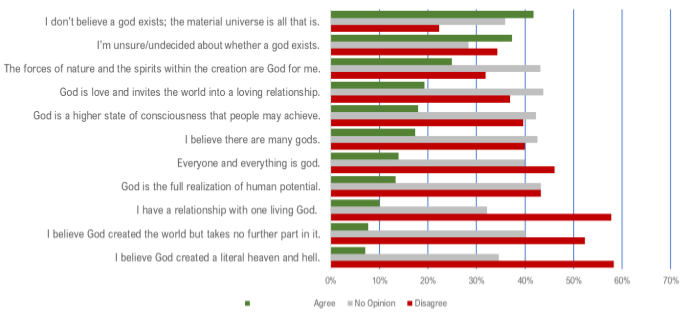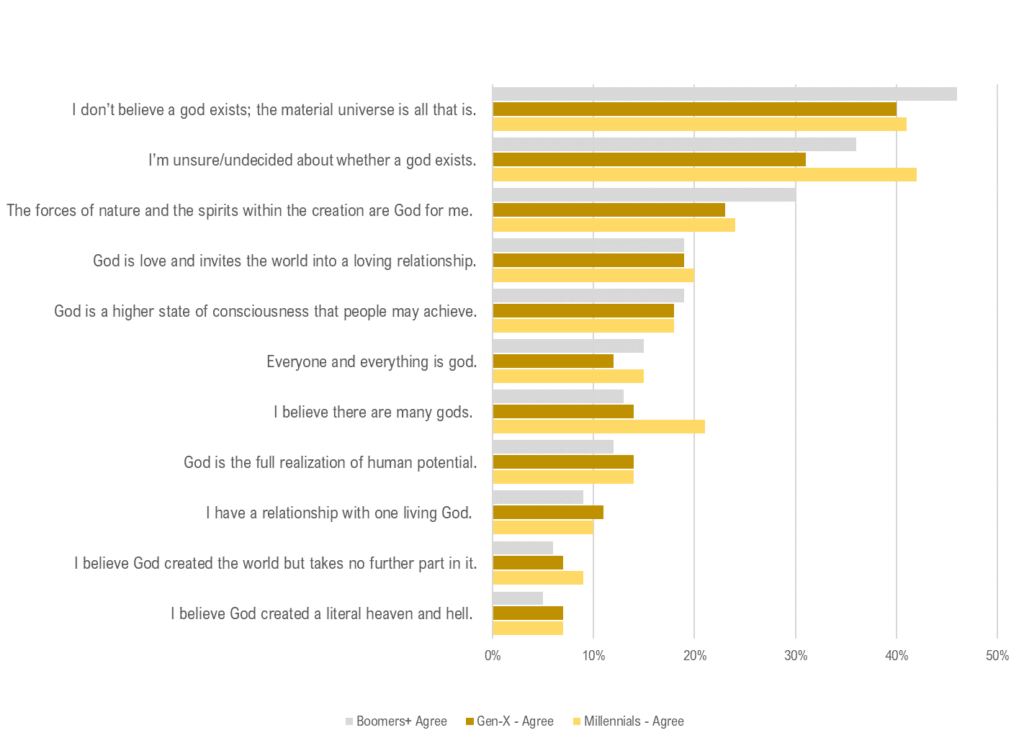In this season of Thanksgiving, Christians give thanks to the God of the Bible – the one we believe is the infinite and sovereign Creator of the universe. The one from whom we receive all good gifts and to whom we express gratitude and praise. Some people who are outside of the Church have a concept of God that is similar to that. But America today is a theologically diverse marketplace of ideas. Every concept of God on the planet, whether it be animist, humanist, polytheist, pantheist, or atheist, has at least some adherents here in the US.
The American Beliefs Study asked a carefully designed, representative sample of 15,000 Americans about their beliefs. When presented with a list of 29 options and asked to mark the religious tradition that best described them, 27% of respondents marked “None/No Religious Preference.” These are the Nones, people who say they have no religion. But just because they are not religious people does not mean they never think about God.
Statements About God: Agree or Disagree?
Which of the various concepts about God floating through the American culture of non-believers are the most popular? One question in the American Beliefs Study asked all the respondents, including the Nones, for their “views about the characteristics or existence of a god.” They rated 11 statements on a five-point scale from “Strongly disagree” to “Strongly agree,” with “No opinion” in the middle. In Figure 9.1 below, the two points for “Strongly disagree” and “Somewhat disagree” are combined, as are “Strongly agree” and “Somewhat agree.”

American Beliefs Study, 2021
What the Nones DO Believe About God
Out of these 11 statements, 25% or more of the Nones agreed with just three.
- 42% of the Nones surveyed agreed with the atheist statement, “I don’t believe a god exists; the material universe is all that is.” On the one hand, this statement attracted more votes than any other. The most common belief about God among the Nones is that there is no God. On the other hand, that leaves a strong 58% majority who believe that God, or a god, exists.
There are many nones who are atheists, but there are many more who believe in God or a god of some kind.
So for many of the Nones, a conversation about spiritual things should probably begin with why it makes sense to believe in the existence of God. But for most of the Nones, a conversation can start with agreement on the existence of God, and then move toward who or what this God or god is, and the merits of the Christian position.
- 37% of the Nones affirmed their uncertainty about God by agreeing they were “unsure/undecided about whether a god exists.” These are people who have no religion, but they are not firm or defiant about the question of God, one way or the other. They are not ready to say they believe in God, nor are they ready to say they don’t. Confusion is the second-most-popular position among the Nones about God in America.
- Another 25% of the Nones agreed with the animist position that “the forces of nature and the spirits within the creation are God for me.” The Bible opens with the declaration, “In the beginning God created the heavens and the earth” (Genesis 1:1). This clearly lays out the biblical position that God and nature are distinct, that God created nature, and that the natural world is not God.
Animist concepts of god within nature and animals are ancient and widespread among indigenous peoples around the world. Historically, animism has tended to give way to monotheistic faiths like Christianity or Islam. In 1900 Africa was 57.9% animist (technically “ethnic religionist”) and only 8.9% Christian. By 2020 the continent was 7.9% animist and 49.3% Christian. In recent decades this global, historic trend has shifted slightly in the opposite direction in America. It’s not that animism has grown in any organized, visible way, but animistic ideas and perspectives have entered the culture and spread. It is important for Christians to recognize this and to be able to distinguish Christian theology from animistic concepts.
The next statement with the highest agreement from the Nones at 19% was “God is love and invites the world into a loving relationship,” reflects Christian theology. That is not a high percentage, but it does show that some Nones still not only believe in God, but still think of God from a Christian point of view.
What the Nones Do NOT Believe About God
Three of the 11 statements about God stand out for how much the Nones disagree with them. Notably, the shares for disagreement at 58% and 52%, significantly outstrip the highest agreement levels for other statements at 42%. This says that the Nones tend to have stronger convictions about what they don’t believe about God than what they do believe about God.
- 52% of the Nones don’t believe “God created the world but takes no further part in it,” a deist idea. In contrast, just eight percent agreed, and 40% had no opinion. This says most of the Nones either believe that God didn’t make the world, or that he is still somehow involved in running it.
The Study did not solely ask people if they believe God created the world. However, the combined responses to this statement and the atheist one infer that half of the Nones don’t acknowledge God, don’t credit Him as the Creator, and deny His influence in the world today. This is not surprising.
The biggest finding here is likely that four in ten Americans with no spiritual background have no opinion on whether God created the world or takes part in it now, suggesting an openness to being convinced on either score.
- 58% of the Nones surveyed disagreed that they “have a relationship with one living God.” One in ten agreed, which contrasts starkly with the 95% of Practicing Christians who agreed.
Understandably, about half the Nones have no relationship with God because they don’t believe God exists. Then there are others among the Nones who believe God exists, or who believe God is active in the world today but deny any relationship with him. The gospel teaches that they can indeed have a relationship with God through Jesus Christ and that such a relationship—as children of God—is wonderful, both for this life and for the life to come.
At least some of the Nones might see the promise of a real and vital relationship with the one living God as good news indeed.
- 58% of the Nones surveyed also disagreed that “God created a literal heaven and hell.” This is a controversial point in American religious discourse today, one that even 20% of Practicing Christians either disagreed with or had no opinion about. It’s likely that any Nones who seek Christian fellowship or faith will find these concepts difficult to embrace.
Still, if Christians pursue relationships with the Nones, the hope is that such relationships will foster an environment where honest discussions about difficult concepts like these can occur.
Differences Between Younger Nones and Older Nones
Little difference exists among the beliefs of Boomer, Gen-X, and Millennial Nones for most of the statements about God or a god in the Study. In seven of these 11 statements, the difference fell within a few percentage points of each other, well within the margin of error.
On the other hand, meaningful differences arose between the generational groups for the other four statements.
Figure 9.3 shows the levels of agreement by different age cohorts of Nones in the survey. Very few respondents were Nones from the Silent generation, and also from Gen-Z, so their numbers below were combined into the statistics for Boomer Nones and Millennial Nones, respectively. The chart also combines the responses of “Somewhat agree” and “Strongly agree” into “Agree.”

American Beliefs Study, 2021
As seen above, the Nones in differing generations diverge in their beliefs about God on several points.
- First, we see a significantly higher 46% of Boomer Nones saying that god doesn’t exist compared to 40% of Gen-X Nones and 41% of Millennial Nones. While not a yawning gap, the difference here is significant and surprising. One might expect atheist beliefs to grow among successively younger generations, but the opposite is true. Entrenched atheism is in slight decline.
- A greater share of the Boomer Nones also held an animist concept of God compared to younger generations. Three in ten Boomer Nones agreed that “the forces of nature and the spirits within the creation are God for me” (30%), vs. 24% of Millennial Nones and 23% of Gen-X Nones. Again, this is not a large gap, but it shows that an animist concept of God is not growing in the American population as the generations progress. About 60% of younger Nones (Millennials and Gen-Xers) are not atheist, so they have some idea of God or a god. That does not mean they believe in the God of the Bible, but the Study at least proves they are not moving toward animist views.
- While Millennial Nones may not be gravitating toward atheism or animism, more of them buy into polytheistic ideas than their forbears do. Two in ten Millennial Nones agreed “…there are many gods” (21%), compared to a much lower 14% of Gen-X Nones and 13% of Boomer Nones.
What’s the best way to interpret this Millennial response? Perhaps, like most Hindus, they are true polytheists, but that seems unlikely. Another more likely explanation might be that they agreed with this statement as a way to affirm religious relativism, like saying, “There are many ways to God,” or “All religions have truth.”
More than one in five Millennials affirms “there are many gods,” which to them probably means they believe no one religion has all the truth.
- Perhaps the most heartening outcome of the generational comparison among the Nones is that Millennial Nones are the most uncertain about who or what God is. The largest group of them, 42%, said they were “unsure/undecided about whether a god exists,” slightly higher than the 41% who denied God. This compares to 31% of Gen-X Nones and 36% of Boomer Nones. Someone who is uncertain or undecided about an issue may be more open to further discussion and new information than one who has already made up their mind. This finding suggests a greater openness among Millennials for the gospel message.
Overall, there is no concept of what or who God is, that has attracted a large percentage of the Nones of any generation. Yes, 30% of Boomer Nones agree with an animist idea, and 21% of Millennial Nones agree with a polytheist idea, but those are not impressive percentages. These shares are not high enough to signal any specific non-Christian concept of God that wins the day for the Nones.
On the other hand, there is no concept of God that any generation has summarily rejected. One in eight Gen-X Nones agreed that “Everyone and everything is god,” and the same share of Boomer Nones agreed that “God is the full realization of human potential.” No statement about a concept of God, by any generational cohort, got a lower level of affirmation than those.
Who is the God of the Nones? There is no God-concept that is widely accepted by any generation of the Nones, and no God-concept that is thoroughly rejected by any.
Key Findings:
- 42% of the Nones believe there is no god, but that leaves 58% who believe there is, or might be, a God or god of some kind.
- Some of the Nones (19%) hold to an idea about God that is consistent with Christian faith.
- Most of the Nones (58%) disagree with the idea that God created a literal heaven and hell.
- Atheism is not stronger among the younger generations of the Nones, but 42% of Millennial Nones indicated they were unsure or undecided about whether a god exists.
- Overall, there is no single concept of God that a large percentage of the Nones agree on.
Ideas for Your Church:
- This Thanksgiving, consider that an effective witness to the Nones calls for good instruction in Christian theology and apologetics. Churches would do well to help members understand the reasons for belief in God, and why Christian teaching about God makes sense. Your members will make more effective witnesses as they are better able to express thankfulness to God in specific and credible ways.
- Don’t assume that all Nones are firm in their unbelief. Many among them – especially Millennials – are unsure or undecided. Invite them to come and learn more, because one in five likely agree with the Christian view of God, and many others are open. Those who believe God is love may be especially receptive to thanking a loving God.
- Recognize that Americans reflect a wide marketplace of ideas about God. Clear teaching about the God of the Bible is vital. Without denying Christianity, it is possible to teach about the various God-concepts people hold to, how they differ from Christian faith, and why Christian faith is unique and transcendent – especially with an attitude of gratitude.
This online study among 14,942 American adults was conducted by Campbell Rinker for ACST from October 2020 through February 2021. Results were balanced by US region, 19 ‘Mosaic’ demographic clusters from Experian, and weighted by age to align with known population characteristics. The study carries a maximum margin of error of ±1.97% at the 95% confidence level within any US Census region. A comparative 2017 study involved the same size audience.
Dirk Rinker and Michael Jaffarian
Dirk is president and CEO of Campbell Rinker, which has been a leading market researcher for nonprofits since the early 1990s. He has designed and implemented research projects for hundreds of ministries, charities, universities, and museums in the U.S. and internationally—helping clients understand and act on the attitudes, motivations, and perceptions of their valuable constituencies.
Michael is a researcher, writer, and consultant to nonprofits. He and his wife were missionaries for 33 years, serving in Singapore, Virginia, Los Angeles, and England. Most of his ministry has been in global mission research. He has studied, and written on, growth trends among tens of thousands of Christian denominations, globally.




